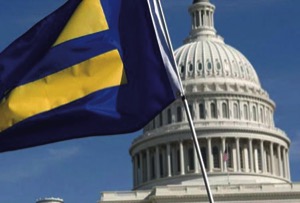
Last summer, I had numerous conversations about the continued relevance of the Human Rights Campaign (HRC). Marriage equality was the law of the land, Obama administration policies were advancing equality in the workplace and schools and Justice Merrick Garland would soon solidify a progressive Supreme Court majority. With President-presumed Hillary Rodham Clinton running on an openly pro-LGBT agenda, how much more federal lobbying would really be needed to keep things rolling?
Those were the days, my friends. They came to an end Nov. 8, 2016. After promising to be a better friend to our community than Clinton, President Trump spent his first 100 days undermining LGBT protections at every turn. Any lingering questions about the need for an effective voice in Washington was erased last week, when in the span of hours: Trump tweeted out a ban on transgender military service; anti-LGBT Kansas Gov. Sam Brownback was named the ambassador at-large for international religious freedom; and Trump’s “beleaguered” attorney general found the energy to file an amicus brief opining that the Civil Rights Act doesn’t cover discrimination based on sexual orientation or gender identity.
Even if the famously mercurial Trump changes his mind on these policies, he could just as easily change it back. Congressional action has long been the best way to enact lasting LGBT protections, which brings us back to the Human Rights Campaign. National campaigns and congressional action are HRC’s specialties. They’ve won awards for effectively lobbying legislators and for using the latest technologies to excite activists and add allies, like the revolutionary “Go Red for Marriage Equality” Facebook filter. Trump can’t tweet out the un-repeal of Don’t Ask Don’t Tell or an end to hate crimes protections precisely because they are laws, not administrative interpretations. HRC led the campaigns for both.
Trump has proven it’s past time to put President Obama’s LGBT friendly administrative decisions into law, and the window to do it may be opening. One surprising effect of Trump’s anti-trans tweetstorm was conservative senators like Joni Ernst (IA), John McCain (AZ), and Orrin Hatch (UT) coming out in support of transgender service. Add 48 Democratic senators and that’s a majority. If there are similar coalitions for broader efforts, such as the Equality Act, which would effectively add LGBT protections throughout federal law, HRC is best equipped to build them.
Aug. 12, the San Diego HRC team will be hosting the annual Gala Dinner. It will likely be quite a show, honoring one of my heroines, State Sen. Toni Atkins, and no doubt discussing how to battle the Trump agenda. As a former volunteer, I know that HRC hasn’t been perfect, but I’ll be at the dinner, because Trump has made it clear that we still need HRC, and they still need our support.











